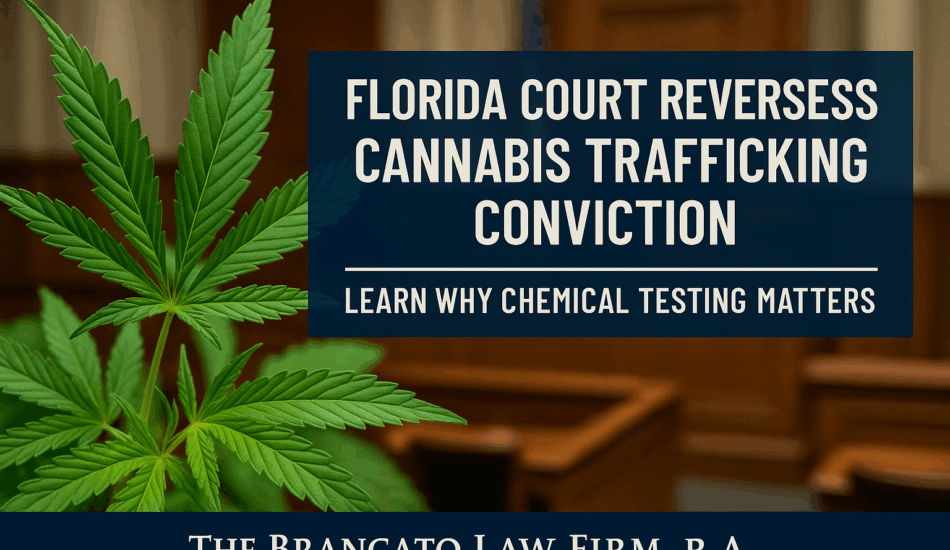Florida Court Reverses Cannabis Trafficking Conviction After Hemp Legalization Challenges Proof Standards

On March 26, 2025, Florida’s Second District Court of Appeal issued a pivotal decision in Pryce M. Campbell, III v. State of Florida (2D2023-0651), overturning a major cannabis trafficking conviction from Hillsborough County. This ruling highlights the powerful impact of hemp legalization—and how a defendant’s own testimony can change the course of a criminal case in Tampa, Florida.
Case Background: A Routine Airport Search Turns Into a Felony Trafficking Charge
In July 2022, Tampa International Airport police, conducting narcotics interdiction, flagged a flight from Denver, Colorado. A K-9 unit alerted to two large duffle bags, which Pryce Campbell later claimed at baggage claim. Officers seized the bags pending a warrant.
Inside, they found fifty vacuum-sealed bundles of a green, leafy substance. Only one sample was tested by the Florida Department of Law Enforcement (FDLE), which confirmed the presence of cannabis. Relying on the combined weight of all the bundles—over 60 pounds—the State charged Campbell with trafficking cannabis between twenty-five and two thousand pounds, a serious first-degree felony under Florida law.
At trial, however, Campbell testified that he believed the bundles contained hemp, not marijuana. He explained that he had purchased them in Oregon at a price of $50 per bundle—significantly lower than the market value of illegal cannabis. Campbell emphasized that if the bundles had contained marijuana, the price would have been substantially higher, around $1,000 per bundle.
Despite his testimony, the jury convicted him, and he was sentenced to three years in prison.
The Legal Issue: Hemp vs. Cannabis — Burden of Proof After Legalization
On appeal, Campbell challenged the conviction, arguing that the State failed to prove that the seized material was illegal cannabis and not legal hemp.
Prior to 2019, prosecutors could often prove cannabis cases based on appearance, smell, and packaging alone. But the 2018 Federal Farm Bill and Florida’s State Hemp Program legalized hemp—defined as cannabis containing less than 0.3% THC. Hemp and marijuana are visually and aromatically identical to the human senses.
Because Campbell raised a plausible defense that the substance was hemp—and every State witness admitted they could not distinguish hemp from marijuana by sight or smell—the Court held that the State had a duty to chemically test enough of the material to exclude the possibility of legal hemp.
Since only one bundle out of fifty was tested, the State failed to prove beyond a reasonable doubt that Campbell possessed enough illegal cannabis to meet the trafficking threshold.
Court’s Ruling: Conviction Reversed, Charge Reduced
The Second DCA reversed Campbell’s trafficking conviction and remanded the case for the trial court to enter a reduced conviction for felony possession of cannabis based solely on the tested sample. The case was sent back for resentencing.
Why Campbell’s Testimony Made a Difference
This case is a textbook example of why defendant testimony matters:
-
Campbell directly challenged the State’s assumptions about the substance’s identity.
-
He offered a credible alternative explanation that fit the facts: low price, lawful origin, and his belief it was hemp.
-
By raising reasonable doubt, he increased the State’s burden to affirmatively prove, through scientific testing, that the full quantity was illegal cannabis.
Once that doubt was raised, the State could no longer rely on appearance or smell—and their failure to properly test all bundles led to the reversal.
Key Takeaways for Cannabis and Drug Defense in Florida
-
Visual and smell-based identifications are no longer enough in cannabis cases involving hemp.
-
Chemical testing must verify the THC content, especially when trafficking charges depend on total weight.
-
Defendants have the right to contest the identity of substances and demand scientific proof.
-
Effective testimony—supported by logical facts like price and origin—can be a game-changer in drug prosecutions.
Protecting Your Rights Against Drug Charges
Today’s drug laws demand modern defense strategies. When prosecutors rely on outdated assumptions, smart defense work can dismantle their cases.
If you are facing cannabis trafficking, possession, or other serious drug charges in Tampa, Hillsborough County, or the surrounding areas, trust The Brancato Law Firm, P.A. to deliver the experienced, aggressive, and informed defense you need.
Call (813) 592-8981 now for a confidential consultation.



